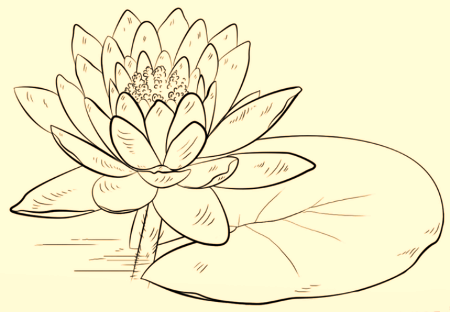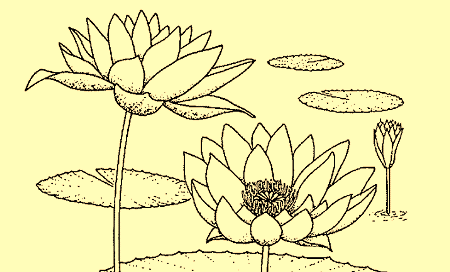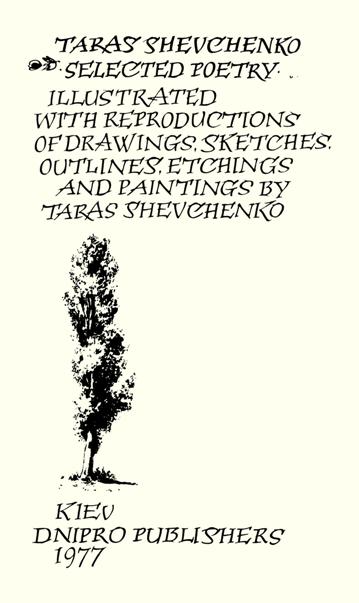|
|
|
|
|

|
Taras Shevchenko
THE LILY
("Lileia / Za shcho mene, yak rosla ya..." /
"Лілея / За що мене, як росла я...")
Translated by John Weir
“Why did to me from childhood days
The people bear ill-will?
And why was 1 when but a maid
By those same people killed?
And yet today why do they prize
My presence in their rooms,
Call me a queen, can’t feast their eyes
Enough upon my blooms?
Why ao they now my praises sing
Ana hold me in esteem?
Pray tell me, flower-of-the-king,
What can the reason be?”
“Alas, my sister, I don’t know,”
Said flower-of-the-king,
As tenderly to her he bowed
His head of rose-and-pink
To touch the Lily’s pallid cheek,
A crumb of comfort bring.
And then the Lily gan to weep,
Her tears the purest dew....
She softly wept, and then she said:
“My brother, I and you
Have loved each other lone, yet I
Have never told vou, friend,
The story of my human life,
The woes I suffered then....
Why did my mother always grieve
And sorrow over me?
When looking at me, why did she
So sadly sigh and weep?
The reason then I did not know,
My brother, why she cried,
Or who it was had wrong’d her so.
I was a little child
And child-like busily 1 played,
Quite happy at my games,
While she grew weaker day by day
And cursed our master’s name.
She died. The master took me then
Into his manor hall.
And so I spent my youth within
Those stately mansion walls.
There I grew up, yet did not guess
I was his bastard child.
And then abroad the master went,
While I was left behind.
The people cursed him, and they came,
The manor set afire....
And me... they did not kill or maim,
But - I can’t fathom why -
Cut off my braids, my tresses fair
That were my joy and pride,
And on my head, now shorn of hair,
A dirty rag they tied.
All jeered. Even Jews spat in my face,
Although themselves despised.
Such were the ills I underwent
In life, my brother dear.
The people did not let me spend
In peace my youthful years,
They hounded me to death. I died
In winter by the road,
But in the spring time came alive
With petals white as snow.
A flower growing in the downs!
I brightened up the grove.
The previous winter... oh my God!
The people, jeering, drove
Me from their midst. But in the spring
With wonder and with love
They looked at me. My snow-white blooms
The girls in garlands twined
And called me lily-of-the-snows;
And I began to thrive
In hot-houses and palace rooms
As well as I grew wild.
Oh floWer-or-the-king, explain,
My brother dear, pray tell:
For what was I by God ordained
A flower here to dwell?
To please the very people who
Detested me and Killed,
And killed my gentle mother too?
Dear God! Is that Your will?”
Again the Lily began to weep.
The flower-of-the-king
With tenderness and pity deep
His head of rose-and-pink
Bent to the Lily’s pallid face
And brushed her tearful cheek.
|
|
Taras Shevchenko, poem "The Lily"
"Lileia / Za shcho mene, yak rosla ya..."
("Лілея / За що мене, як росла я...")
1846, Kiev (Київ)
Translated by John Weir
Source: Taras Shevchenko. Selected poetry. Kiev, Dnipro, 1977, p.198-200.

Original publication:
Taras Shevchenko. Zibrannia tvoriv: U 6 t. — K., 2003.
— T. 1: Poeziia 1837-1847. — S. 373-375; S. 753-754
|
Тарас Шевченко
ЛІЛЕЯ
«За що мене, як росла я,
Люде не любили?
За що мене, як виросла,
Молодую вбили?
За що вони тепер мене
В палатах вітають,
Царівною називають,
Очей не спускають
З мого цвіту? Дивуються,
Не знають, де діти!
Скажи мені, мій братику,
Королевий Цвіте!»
«Я не знаю, моя сестро».
І Цвіт Королевий
Схилив свою головоньку
Червоно-рожеву
До білого пониклого
Личенька Лілеї.
І заплакала Лілея
Росою-сльозою...
Заплакала і сказала:
«Брате мій, з тобою
Ми давно вже кохаємось,
А я й не сказала,
Як була я людиною,
Як я мордувалась.
Моя мати... чого вона,
Вона все журилась
І на мене, на дитину,
Дивилась, дивилась
І плакала? Я не знаю,
Мій брате єдиний!
Хто їй лихо заподіяв?
Я була дитина,
Я гралася, забавлялась,
А вона все в’яла,
Та нашого злого пана
Кляла-проклинала.
Та й умерла. А мене пан
Взяв догодувати.
Я виросла, викохалась
У білих палатах.
Я не знала, що байстря я,
Що його дитина.
Пан поїхав десь далеко,
А мене покинув.
І прокляли його люде,
Будинок спалили...
А мене, не знаю за що,
Убити не вбили,
Тілько мої довгі коси
Остригли, накрили
Острижену ганчіркою.
Та ще й реготались.
Жиди навіть нечистії
На мене плювали.
Отаке-то, мій братику,
Було мені в світі.
Молодого, короткого
Не дали дожити
Люде віку. Я умерла
Зимою під тином,
А весною процвіла я
Цвітом при долині,
Цвітом білим, як сніг, білим!
Аж гай звеселила.
Зимою люде... Боже мій!
В хату не пустили.
А весною, мов на диво,
На мене дивились.
А дівчата заквітчались
І почали звати
Лілеєю-снігоцвітом;
І я процвітати
Стала в гаї, і в теплиці,
І в білих палатах.
Скажи ж мені, мій братику,
Королевий Цвіте,
Нащо мене Бог поставив
Цвітом на сім світі?
Щоб людей я веселила,
Тих самих, що вбили
Мене й матір?.. Милосердий
Святий Боже милий!»
І заплакала Лілея,
А Цвіт Королевий
Схилив свою головоньку
Червоно-рожеву
На білеє пониклеє
Личенько Лілеї.
|
|
За матеріалами: Тарас Шевченко. Зібрання творів: У 6 т. — Київ, "Наукова думка", 2003. Том 1: Поезія 1837-1847, стор. 373 - 375; 753 - 754.

More Taras Shevchenko's poems translated from Ukrainian into English by John Weir:
 John Weir (Ivan Fedorovych Viv'yurskiy), a Canadian of the Ukrainian lineage, was a talented English-speaking translator of the second half of the 19ih century. During his life he translated 29 Shevchenko's poetic works, a prosaic foreword to the poem of «The Haidamaky», the narrative «The Artist», the poet’s autobiographic letter and some excerpts from his diary. John Weir, being a translator with the Ukrainian root, felt melodiousness of Shevchenko’s lines, understood a social foundation of the poet's artistic images. John Weir (Ivan Fedorovych Viv'yurskiy), a Canadian of the Ukrainian lineage, was a talented English-speaking translator of the second half of the 19ih century. During his life he translated 29 Shevchenko's poetic works, a prosaic foreword to the poem of «The Haidamaky», the narrative «The Artist», the poet’s autobiographic letter and some excerpts from his diary. John Weir, being a translator with the Ukrainian root, felt melodiousness of Shevchenko’s lines, understood a social foundation of the poet's artistic images.
Споріднені публікації, за тегами:
|
|
|
|
|
|



